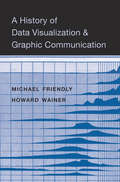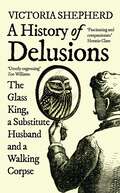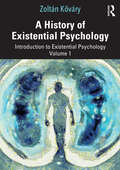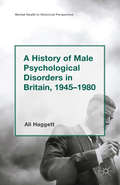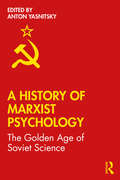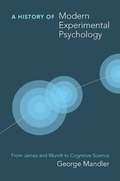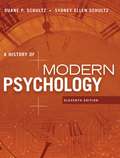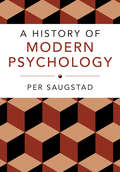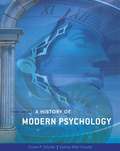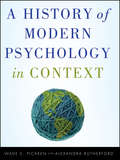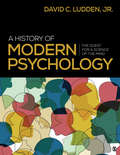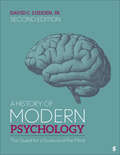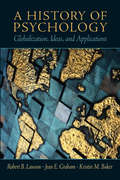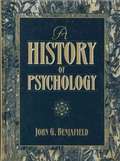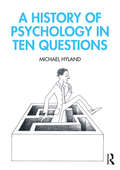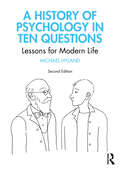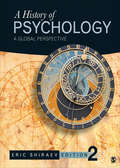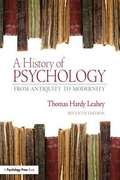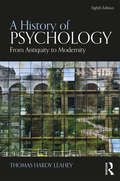- Table View
- List View
A History of Data Visualization and Graphic Communication
by Howard Wainer Michael FriendlyA comprehensive history of data visualization—its origins, rise, and effects on the ways we think about and solve problems. With complex information everywhere, graphics have become indispensable to our daily lives. Navigation apps show real-time, interactive traffic data. A color-coded map of exit polls details election balloting down to the county level. Charts communicate stock market trends, government spending, and the dangers of epidemics. A History of Data Visualization and Graphic Communication tells the story of how graphics left the exclusive confines of scientific research and became ubiquitous. As data visualization spread, it changed the way we think. Michael Friendly and Howard Wainer take us back to the beginnings of graphic communication in the mid-seventeenth century, when the Dutch cartographer Michael Florent van Langren created the first chart of statistical data, which showed estimates of the distance from Rome to Toledo. By 1786 William Playfair had invented the line graph and bar chart to explain trade imports and exports. In the nineteenth century, the “golden age” of data display, graphics found new uses in tracking disease outbreaks and understanding social issues. Friendly and Wainer make the case that the explosion in graphical communication both reinforced and was advanced by a cognitive revolution: visual thinking. Across disciplines, people realized that information could be conveyed more effectively by visual displays than by words or tables of numbers. Through stories and illustrations, A History of Data Visualization and Graphic Communication details the 400-year evolution of an intellectual framework that has become essential to both science and society at large.
A History of Delusions: The Glass King, a Substitute Husband and a Walking Corpse
by Victoria Shepherd&‘Fascinating and compassionate&’ Horatio Clare The King of France – thinking he was made of glass – was terrified he might shatter…and he wasn&’t alone. After the Emperor met his end at Waterloo, an epidemic of Napoleons piled into France&’s asylums. Throughout the nineteenth century, dozens of middle-aged women tried to convince their physicians that they were, in fact, dead. For centuries we&’ve dismissed delusions as something for doctors to sort out behind locked doors. But delusions are more than just bizarre quirks – they hold the key to collective anxieties and traumas. In this groundbreaking history, Victoria Shepherd uncovers stories of delusions from medieval times to the present day and implores us to identify reason in apparent madness.
A History of Existential Psychology: Introduction to Existential Psychology Volume 1
by Zoltán KőváryThe first in a two-part set, this book takes a deep dive into the history and theory of existential psychology.Beginning with a discussion of the “existentialism and psychology problem,” the book presents the philosophical and historical roots of existential psychology. It introduces the most important philosophical schools in the development of existentialism and their creators, such as Kierkegaard, Nietzsche, Heidegger and Sartre, as well as the literary roots of existentialism in the writings of Dostoevsky and Kafka and the important contribution of psychoanalysis and phenomenological psychiatry. The book then goes on to look at the existential psychology schools, including daseinsanalysis, logotherapy and existential analysis, the existential-humanistic school and the existential-phenomenological school.Going beyond the questions of therapy and counseling that typically make up the study of existential psychology, the book offers the ultimate introduction for students and scholars of this fascinating and deeply rooted discipline. It may also interest professionals working in related fields.
A History of Male Psychological Disorders in Britain, 1945-1980 (Mental Health in Historical Perspective)
by Alison HaggettThis book is open access under a CC BY license and explores the under-researched history of male mental illness from the mid-twentieth century. It argues that statistics suggesting women have been more vulnerable to depression and anxiety are misleading since they underplay a host of alternative presentations of 'distress' more common in men.
A History of Marxist Psychology: The Golden Age of Soviet Science
by Anton YasnitskyAn illuminating and original collection of essays on 20th century Russian psychology, offering unparalleled coverage of the scholarship of Vygotsky and his peers. Yasnitsky et al. challenge our assumptions about the history of Soviet science and the nature of Soviet Marxism and its influence on psychological thinking. He significantly broadens the discussion around Vygotsky’s life and work and its historical context, applying theories of other notable thinkers such as Alexander Luria and the much-neglected philosopher/psychologist Sergei Rubinstein, alongside key movements in history, such as the pedology and psychohygiene. A diverse range of researchers from countries such as Argentina, Brazil, Canada, France, Russian Federation, Switzerland, Ukraine, and the UK, give this book a truly global outlook. This is an important and insightful text for undergraduate and postgraduate students and scholars interested in the history of psychology and science, social and cultural history of Russia and Eastern Europe, Marxism, and Soviet politics.
A History of Modern Experimental Psychology: From James and Wundt to Cognitive Science
by George MandlerMandler traces the evolution of modern experimental and theoretical psychology from these beginnings to the cognitive revolution of the late 20th century. He emphasizes the social and cultural context, showing how different theoretical developments reflect the values of the society.
A History of Modern Psychology
by Duane P. Schultz Sydney Ellen SchultzThe focus of this book is the history of modern psychology, the period beginning in the late nineteenth century, when psychology became a separate and independent discipline. Although, the authors briefly review earlier philosophical thought, they concentrate on issues directly related to the establishment of psychology as a new and distinct field of study. The purpose is to present a history of modern psychology, not the centuries of philosophical work that preceded it. Although the chapters are organized in terms of the schools of thought, these systems resulted from the work of individual scholars, researchers, organizers, and promoters. With the hindsight of history, the authors trace the pattern and the continuity of the development of modern psychology.
A History of Modern Psychology
by Per SaugstadA History of Modern Psychology provides students with an engaging, comprehensive, and global history of psychological science, from the birth of the field to the present. It examines the attempts to establish psychology as a science in several countries and epochs. The text expertly draws on a vast knowledge of the field in the United States, England, Germany, France, Russia, and Scandinavia, as well as on author Per Saugstad's keen study of neighboring sciences, including physiology, evolutionary biology, psychiatry, and neurology. Offering a unique global perspective on the development of psychology as an empirical science, this text is an ideal introduction to the field for students and other readers interested in the history of modern psychology.
A History of Modern Psychology (Tenth Edition)
by Duane P. Schultz Sydney Ellen SchultzIn this book, the authors personalize the history of psychology not only by using biographical information on influential theorists, but also by showing you how major events in those theorists' lives have affected the authors' own ideas, approaches, and methods.
A History of Modern Psychology in Context
by Alexandra Rutherford Wade PickrenA fresh look at the history of psychology placed in its social, political, and cultural contextsA History of Modern Psychology in Context presents the history of modern psychology in the richness of its many contexts. The authors resist the traditional storylines of great achievements by eminent people, or schools of thought that rise and fall in the wake of scientific progress. Instead, psychology is portrayed as a network of scientific and professional practices embedded in specific temporal, social, political, and cultural contexts. The narrative is informed by three key concepts--indigenization, reflexivity, and social constructionism--and by the fascinating interplay between disciplinary Psychology and everyday psychology.The authors complicate the notion of who is at the center and who is at the periphery of the history of psychology by bringing in actors and events that are often overlooked in traditional accounts. They also highlight how the reflexive nature of Psychology--a science produced both by and about humans--accords history a prominent place in understanding the discipline and the theories it generates.Throughout the text, the authors show how Psychology and psychologists are embedded in cultures that indelibly shape how the discipline is defined and practiced, the kind of knowledge it creates, and how this knowledge is received. The text also moves beyond an exclusive focus on the development of North American and European psychologies to explore the development of psychologies in other indigenous contexts, especially from the mid-20th-century onward.
A History of Modern Psychology: The Quest for a Science of the Mind
by David C. LuddenA History of Modern Psychology: The Quest for a Science of the Mind presents a history of psychology up to the turn of the 21st century. Author David C. Ludden, Jr. uses a topical approach to discuss key thinkers and breakthroughs within the context of various schools of thought, allowing students to see how philosophers, researchers, and academics influenced one another to create the rich and diverse landscape of modern psychology. Through detailed timelines and Looking Back and Looking Ahead sections, the book provides connections between movements and gives students a deeper appreciation for the transference of knowledge that has shaped the field.
A History of Modern Psychology: The Quest for a Science of the Mind
by David C. LuddenA History of Modern Psychology: The Quest for a Science of the Mind presents a history of psychology up to the turn of the 21st century. Author David C. Ludden, Jr. uses a topical approach to discuss key thinkers and breakthroughs within the context of various schools of thought, allowing students to see how philosophers, researchers, and academics influenced one another to create the rich and diverse landscape of modern psychology. Through detailed timelines and Looking Back and Looking Ahead sections, the book provides connections between movements and gives students a deeper appreciation for the transference of knowledge that has shaped the field.
A History of Modern Psychology: The Quest for a Science of the Mind
by David LuddenA History of Modern Psychology: The Quest for a Science of the Mind describes the evolution of psychology into the twenty-first century with coverage of recent events and findings that transform our understanding of the past. With a topical approach that presents key thinkers within the context of schools of thought, students are able to see how philosophers, researchers, and academics influenced one another to create the rich and diverse landscape of modern psychology in a global context. In the new Second Edition, the author expands coverage of unsung pioneers (philosopher Al-Balkhi, zoologist Charles Henry Turner, psychiatrist Grunya Sukhareva, and others), revisits the legacy of Francis Galton, explores the "Vygotsky boom," and includes new discussion of the impact of Philip Zimbardo′s Stanford Prison Experiment. Through detailed timelines and features such as "Looking Back" and "Looking Ahead," Ludden gives students a deeper appreciation for the transference of knowledge that shaped the field.
A History of Modern Psychology: The Quest for a Science of the Mind
by David LuddenA History of Modern Psychology: The Quest for a Science of the Mind describes the evolution of psychology into the twenty-first century with coverage of recent events and findings that transform our understanding of the past. With a topical approach that presents key thinkers within the context of schools of thought, students are able to see how philosophers, researchers, and academics influenced one another to create the rich and diverse landscape of modern psychology in a global context. In the new Second Edition, the author expands coverage of unsung pioneers (philosopher Al-Balkhi, zoologist Charles Henry Turner, psychiatrist Grunya Sukhareva, and others), revisits the legacy of Francis Galton, explores the "Vygotsky boom," and includes new discussion of the impact of Philip Zimbardo′s Stanford Prison Experiment. Through detailed timelines and features such as "Looking Back" and "Looking Ahead," Ludden gives students a deeper appreciation for the transference of knowledge that shaped the field.
A History of Personality Psychology: Theory, Science, and Research from Hellenism to the Twenty-first Century
by Frank DumontFrank Dumont presents current personality psychology with a fresh description of its current status as well as its prospects. Play, sex, cuisine, creativity, altruism, pets, grieving rituals, and other oft-neglected topics broaden the scope of this fascinating study. This tract is imbued with historical perspectives that reveal the continuity in the evolving science and research of this discipline over the past century. The author places classic schemas and constructs, as well as current principles, in the context of their socio-political catalysts. He further relates this study of the person to life-span developmental issues and to cultural, gender-specific, trait-based, genetic/epigenetic, and evolutionary research findings. Personality psychology has recently reconciled itself to more modest paradigms for describing, explaining, and predicting human behaviour than it generated in the 19th and 20th centuries. This book documents that transformation, providing valuable information for health-service professionals as well as to teachers, researchers, and scientists.
A History of Psychology
by Robert B. Lawson Jean E. Graham Kristin M. BakerFor advanced undergraduate History of Psychology courses; also appropriate for graduate-level seminar courses in the discipline. Comprehensive and engaging in subject matter, this text integrates materials from religion (Judaism, Christianity, and Muslim as well as Buddhism and Confucianism), philosophy, and biology into the historical development of psychology. It includes a treatment of issues in the local and global society, an extensive look at women and minorities, and integrates overarching psychological principles, ideas, and applications that have shaped and will shape the global history of psychology. It highlights the interaction between psychology and the environmental context in which the discipline developed.
A History of Psychology
by John G. BenjafieldCombining an historical overview of psychology with a focus on advances in the 20th century, this text contains chapters on the history of developmental psychology, the history of methodology, humanistic psychology and cognitive psychology. It also considers the work of William James, Freud and Jung.
A History of Psychology in Ten Questions
by Michael HylandThis student-friendly book on the history of psychology covers the key historical developments and controversies in all areas of psychology, linking history to the present by focusing on ten conceptual issues that are relevant today. How did psychology become a science, and what kind of science did it become? How do psychologists measure and explain the fact that in some ways everyone is unique? Is psychoanalysis scientific? Why did cognitive science replace behaviorism? This book addresses all these questions and more, covering the whole range of psychology, from neuroscience and artificial intelligence to hermeneutics and qualitative research in the process. Drawing on the author’s experience of how to make the subject interesting for students, the book is structured around ten key questions that engage with all the core areas of psychology and the main schools of thought. Showing how each of the different approaches or paradigms within psychology differ not based on data but on assumptions, Michael Hyland provides an engaging introduction to debates from history and in contemporary society. Including boxed material on hot topics, historical figures, studies/experiments, and quirky facts, this is the ideal book for undergraduate students of psychology taking CHIPS and other history of psychology modules.
A History of Psychology in Ten Questions: Lessons for Modern Life
by Michael HylandThe second edition of this student-friendly book uses the history of psychology as a backdrop to provide a commentary on key historical developments and modern dilemmas, whilst encouraging readers to think about questions affecting life today. How do you know if something is true? How do you explain and control behaviour? What is the relation between psychology and physiology? How will artificial intelligence affect humanity? This book answers these and other questions by covering a wide range of topics in psychology, including neuroscience, personality, behaviourism, cognitive and humanistic psychology, qualitative methodology, inheritance and hermeneutics, all brought up to date with recent research. Drawing on the author’s own teaching, the book is structured around ten key questions where the history of psychology provides insight into modern life. Accessible for all readers, each chapter is also equipped with a ‘Lesson for modern life’ and nine ‘Essays and discussion topics’ so that readers can apply these ideas to their own thought practice. These provide interesting topics for discussion around issues that affect life and society. This insightful text encourages readers to question their own lives and the wider society by providing an engaging introduction to debates in history and contemporary society. The book is also the ideal resource for undergraduate students of psychology taking CHIPS and other history of psychology modules, as well as anyone generally interested in learning more about this fascinating subject.
A History of Psychology in Western Civilization
by Bruce K. Alexander Curtis P. SheltonThis book is a re-introduction to psychology. It focuses on great scholarly thinkers, beginning with Plato, Marcus Aurelius and St Augustine, who gave the field its foundational ideas long before better known 'founders', such as Galton, Fechner, Wundt and Watson, appeared on the scene. Psychology can only achieve its full breadth and potential when we fully appreciate its scholarly legacy. Bruce Alexander and Curtis Shelton also argue that the fundamental contradictions built into psychology's history have never been resolved, and that a truly pragmatic approach, as defined by William James, can produce a 'layered' psychology that will enable psychologists to face the fearsome challenges of the twenty-first century. A History of Psychology in Western Civilization claims that contemporary psychology has overemphasized the methods of physical science and that psychology will need a broader scientific orientation alongside a scholarly focus in order to fully engage the future.
A History of Psychology: A Global Perspective
by Eric ShiraevOffering a fresh, accessible, and global approach to the history of psychology, the fully revised Second Edition of Eric B. Shiraev’s A History of Psychology: A Global Perspective, provides a thorough view of psychology’s progressive and evolving role in society and how its interaction with culture has developed throughout history, from ancient times through the Middle Ages and the modern period to the current millennium. Taking an inclusive approach, the text addresses contemporary and classic themes and theories with discussion of psychology′s development in cultures and countries all too often neglected in overviews of the field. High-interest topics, including the validity of psychological knowledge and volunteerism, offer readers the opportunity to apply the history of psychology to their own lives.
A History of Psychology: A Global Perspective
by Eric ShiraevOffering a fresh, accessible, and global approach to the history of psychology, the fully revised Second Edition of Eric B. Shiraev’s A History of Psychology: A Global Perspective, provides a thorough view of psychology’s progressive and evolving role in society and how its interaction with culture has developed throughout history, from ancient times through the Middle Ages and the modern period to the current millennium. Taking an inclusive approach, the text addresses contemporary and classic themes and theories with discussion of psychology′s development in cultures and countries all too often neglected in overviews of the field. High-interest topics, including the validity of psychological knowledge and volunteerism, offer readers the opportunity to apply the history of psychology to their own lives.
A History of Psychology: From Antiquity To Modernity, 7th Edition
by Thomas Hardy LeaheyProvides a narrative history of psychology. A History of Psychology: From Antiquity to Modernity begins tracking psychology from the development of folk psychology as the key adaptation of humans at the dawn of history. It then traces the Classical, medieval, and early modern periods to present day psychology. The text covers scientific, applied, and professional psychology.<P><P> Although theoretical and empirical arguments inside psychology about the nature of mind and behavior are not neglected, A History of Psychology shows how psychology's development has been shaped by social, economic, and political forces external to it, and, in turn, how the mature psychology of the late 20th century has begun to shape the society in which it arose. The text carefully examines how issues in psychology reflect and affect concepts that lie outside the technical concerns of psychology as a science and profession.<P> Upon completing this text, readers will be able to:<P> * Know the events in the history of scientific, applied, and professional psychology<P> * Understand how psychology,s development was shaped by external forces<P> * Describe how psychology has and continues to shape society<P>
A History of Psychology: From Antiquity to Modernity
by Thomas Hardy LeaheyA History of Psychology places social, economic, and political forces of change alongside psychology’s internal theoretical and empirical arguments, illuminating how the external world has shaped psychology’s development, and, in turn, how the late twentieth century’s psychology has shaped society. Featuring extended treatment of important movements such as the Enlightenment and the Scientific Revolution, the textbook approaches the material from an integrative rather than wholly linear perspective. The text carefully examines how issues in psychology reflect and affect concepts that lie outside the field of psychology’s technical concerns as a science and profession. This new edition features expanded attention on psychoanalysis after its founding as well as new developments in cognitive science, artificial intelligence, and behavioral economics. Throughout, the book strengthens its exploration of psychological ideas and the cultures in which they developed and reinforces the connections between psychology, modernism, and postmodernism. The textbook covers scientific, applied, and professional psychology, and is appropriate for higher-level undergraduate and graduate students.
A History of Psychology: Globalization, Ideas, and Applications
by Robert B. Lawson E. Doris Anderson Antonio Cepeda-BenitoGlobal, interdisciplinary, and engaging, this textbook integrates materials from philosophical and biological origins to the historical development of psychology. Its extensive coverage of women, minorities, and psychologists around the world emphasizes psychology as a global phenomenon while looking at both local and worldwide issues. This perspective highlights the relationship between psychology and the environmental context in which the discipline developed. In tracing psychology from its origins in early civilizations, ancient philosophy, and religions to modern science, technology, and applications, this book integrates overarching psychological principles and ideas that have shaped the global history of psychology, keeping an eye toward the future of psychology. Updated and revised throughout, this new edition also includes a new chapter on clinical psychology.
